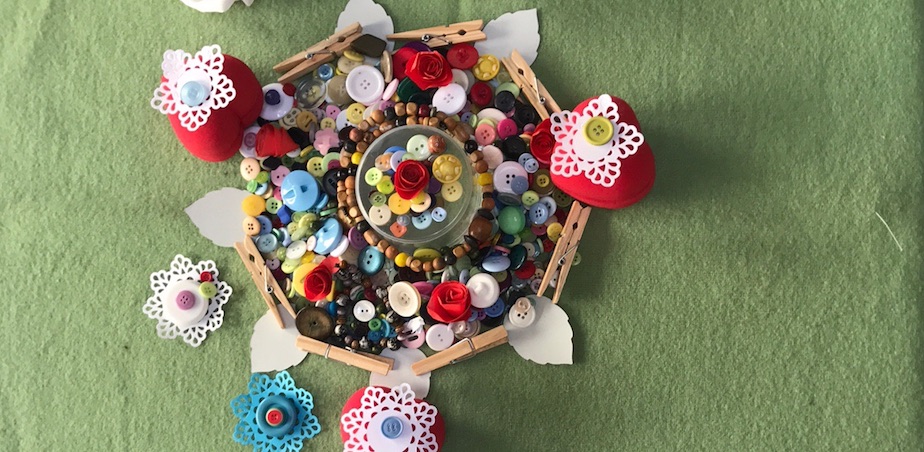Guest Blogger: Vicky Donnelly, Education Coordinator at Galway One World Centre


Vicky Donnelly is coordinator of the Galway One World Centre, and works on the design and delivery of the Global Teachers Award CPD programme, as well as development education and antiracism workshops for schools, community groups and universities.
Exploring Refuge and Migration Issues With Young Children: notes from Baboro’s Primary In-Career Course, Drama Tools for the Classroom.
You know you’re in good hands when the facilitator of a week-long course for primary teachers, can guide a roomful of strangers from the polite stiffness of a Monday morning, to improvising scenes at a horse fair, and tracking the thoughts of a young character’s deepest fears and longings, all before lunch on the first day.
For the first week in July I had the good fortune to spend a week participating in Baboro’s ‘Drama Tools for the Classroom’, facilitated by the truly remarkable Irene O’Meara, who drew effortlessly from her vast experience in theatre, music, visual arts, a Masters in Drama and Theatre Studies, and all refined through years of real life experience in the classroom. In addition to a number of primary school teachers, our diverse group included a youth mentor, a Spanish teacher, a Community Circus coordinator, an after-schools programme animator, a couple of play therapists, and me; a development education worker with the Galway One World Centre.
GOWC’s function is to provide workshops for schools, youth and community groups addressing a range of local and global justice issues, including refuge and migration; poverty; and anti-racism perspectives. Since 2012, GOWC has been delivering the Global Teachers Award programme in Ireland, offering training around the country for teachers who wish to bring a greater global justice perspective to their work.
In that time, the issue of rights for people fleeing danger and persecution has become increasingly urgent, along with the need to create opportunities to explore it in the classroom. But how? There are real challenges involved in addressing a crisis of this scale, in the context of rising Islamophobia, racism and right-wing sentiments, and a crushing accommodation crisis at home. And even greater challenges emerge when working with young children. There are numerous teaching resources available, and some of our own materials developed in-house, but I came looking for fresh ideas and inspiration about how Drama might offer ways of engaging younger children. In particular, I was seeking an age-appropriate approaches, that would allow for deep exploration of thoughts and feelings, and build empathy, without overwhelming children, but also, without trivialising the issues.
Over the course of the week, Irene shared numerous insights, tips and practical examples from her vast knowledge and experience, taking us through a number of drama conventions and sharing ideas about books, poems, artefacts and images for prompts. For my purposes though, most useful was her reminder of the 3 prerequisites for drama in the classroom: a safe environment; appropriate content; and a fictional lens.
While these are, of course, essential for approaching any theme, they provided me with a helpful framework to guide and anchor the design of classroom activities and lesson plans on the theme of refuge and migration.
The safety of the environment, beyond the practical need to ensure that the space is free of hazards, may also include considerations about working in smaller groups, to avoid intimidating ‘high-focus’ attention, or to ensure that consent is sought in advance before ‘spotlighting’ individuals. This concern for a safe environment also spills over into the need to make sensitive choices about the content being presented: is it age appropriate? Whose perspective is being shared? Are the characters portrayed as having agency, or as helpless victims?
Then comes the fictional lens. At a time of unprecedented crisis – over 65 million people are now displaced from their homes by war, conflict and persecution – I found myself gently steered away from the stark world of statistics and terrifying news reports, to the more accessible world of fiction.
Irene’s frequent reminders of the power of the fictional lens to explore potentially ‘difficult issues’, were peppered with quotes from the likes of Emerson and Camus (“Fiction is the lie through which we tell the truth”) and were accompanied with examples from the classroom, using storybooks, such as the beautifully illustrated When Jesse Came Across the Sea (Amy Hest and PJ Lynch) and Oskar and the Eight Blessings (Tanya and Richard Simon). Though perhaps removed, geographically and temporally, from today’s crisis, the issues raised in these stories have much in common with the contemporary crisis, and provide opportunities for children to make those connections for themselves, and to explore the values, tensions, conflicts and opportunities attached to each. Even seemingly whimsical storybooks, such as The Lighthouse Keeper’s Rescue (Rhonda and Simon Armitage), were opened up as spaces for young children to consider how it might feel to be displaced, or to need help from the wider community, as well as celebrating the diversity within a community that makes change possible.
While the news from Syria, Sudan or Iraq may be overwhelming for children (and, frankly, for many adults), the story of one child, or one family, will contain some universally recognisable details and concerns, and may be more relatable for pupils. All children love to play. All children want to feel safe.
This was the thinking behind German author, Kirsten Boie’s decision to base her book Everything Will Be Alright, on the experiences of a young Syrian girl, Rahaf, and her family. In Kirstens’ book, the family’s luggage, containing Rahaf’s doll, is stolen by people smugglers on the journey across the Mediterranean. “She’s very unhappy about losing her doll that way. The children here always start by asking, ‘Has she got her doll back?’ I think the reason for that is that this is something that they can imagine [happening to] themselves, whereas all the bombs and fighting and nights on the Mediterranean… they can’t imagine that happening to themselves. “Stories,” she explains, “…always make it much easier for children to understand something more than theoretical knowledge. I think that’s the chance we have…”